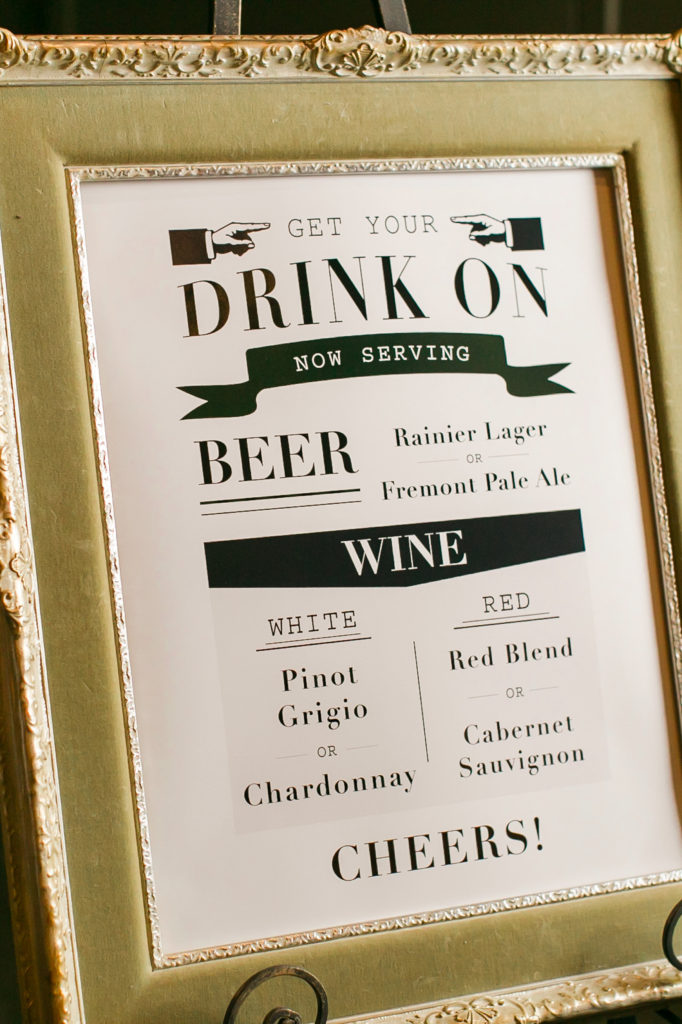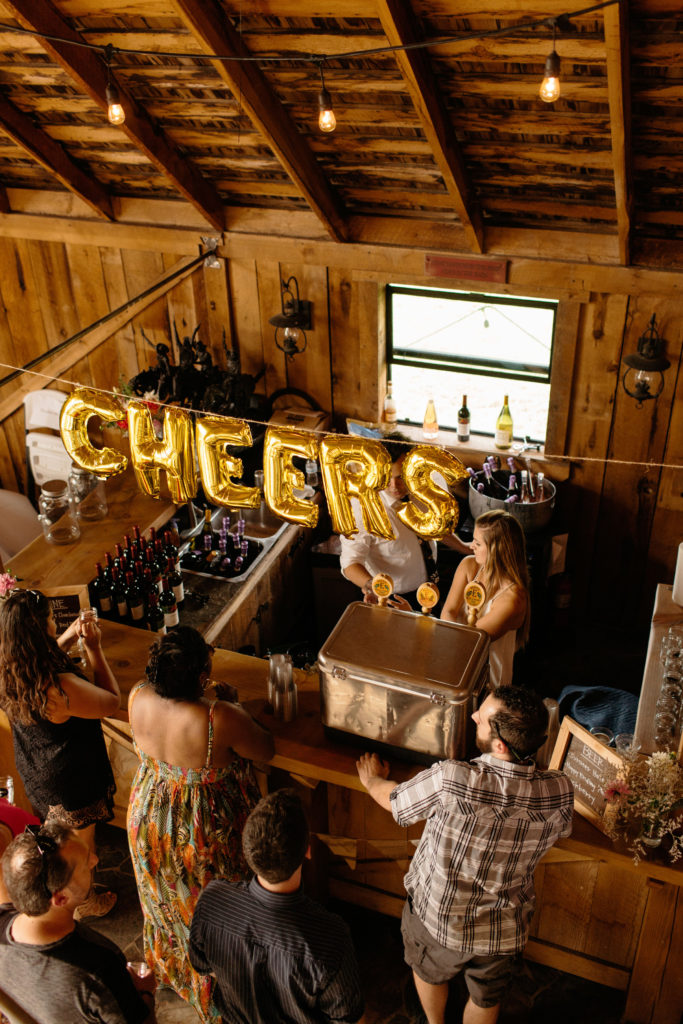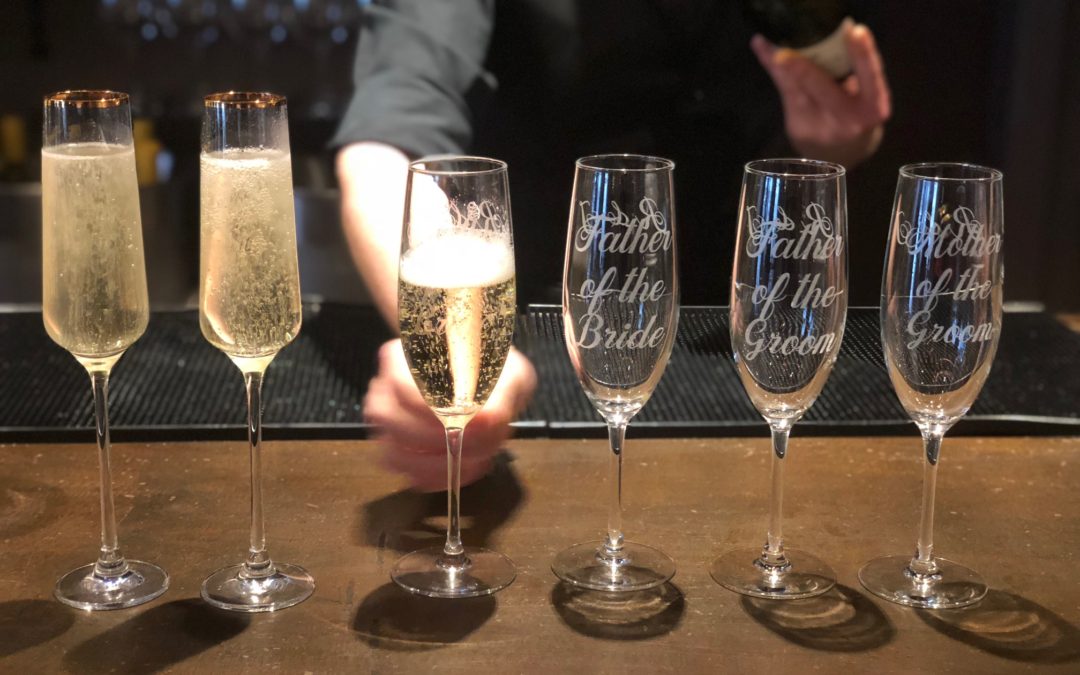Wedding receptions and alcohol go hand-in-hand like the bride and groom. As they say, “no great story started with someone eating a salad … “
As you plan for the fun ahead, there are several things to keep in mind for an affordable and safe event.
ONE) Know the alcohol rules for your venue before you sign the contract. It is not unusual for the venue to have strict rules and limitations around alcohol service. Some venues limit alcohol to wine and beer options only – if you have your heart set on signature bride and groom cocktails, you’ll be quickly disappointed if you didn’t see this in your contract. Often venues will limit bar service hours. The limit may be venue driven or may be a state regulation. 5-hour limits are common – so if your reception is set to begin at 4, know that bar service is over at 9 p.m. sharp.
TWO) Hire a professional. This is not the time to have your neighbor do the bartending. And certainly, don’t have guests pour and mix their own – even if you’re hosting in your backyard! First and foremost, there are licensing and liability concerns with those options, but also you want a professional that can move that line quickly and make/pour stellar drinks expeditiously and with style. Often the venue or caterer will have bartending staff in their line-up, but if you need to hire someone, be sure they are licensed appropriately – and as with all vendors, gather recommendations and check reviews. And don’t forget the gratuity! If it isn’t factored in to the overall cost of bar service, don’t forget to add it on for your hard-working bar professional!

Lloyd Photography
THREE) There are 4 standard bar service options to choose from:
A) Hosted open bar: Full bar service, all night – at no cost to your guests. However, this will cost you – and will run 10-20% of your wedding budget.
B) Limited bar: There are two types of thought here.
- Limited selection: If you limit your alcohol selection to wine or beer – and maybe a single signature cocktail – your overall cost will be less, bartending complexity is decreased, and the line at the bar will move faster.
- Limited service: You can also limit consumption to specific times – cocktail hour, the toast, during dancing – with waiters to circulate with drink trays at designated times. This provides “classy” service, but limits the drink consumption and the cost simply because of decreased accessibility.
C) Cash bar: Try not to do this. I know it may seem like a huge cost savings to you, but think about guest experience. You don’t invite someone to your dinner party and then charge for food – you shouldn’t invite someone to your wedding to celebrate with you and then charge for drinks at the party. There are other areas you can cut back on to compensate for paying for guest drinks. I’ve also experienced a hosted bar up to a certain limit and THEN have your guests be responsible.
D) No bar: If you don’t drink – or your friends and family are not ones to imbibe, you can skip the bar all together. If you don’t fall into that category, don’t skip the bar – your guests will be expecting one.
FOUR) BYOB or Venue-Provided?
Some venues limit your options to their own bar service – both the alcohol and the bartender. Some allow you to bring in your own alcohol and bartender. And some require their bartender, but you can bring in your own alcohol. Know what your contract stipulates.
If you have the option of bringing your own, there can be a cost savings – but first look in your contract for corkage fees – which can be up to $10 or more per bottle and can quickly eliminate any savings.
Even if there is savings on bringing your own, it will be easier on your time to go with their selection options – otherwise you have to manage delivery and removal of leftovers of your special pick. Or you can negotiate with venue to accommodate your special requests. Include in those negotiations a request to pay only for what is consumed – not for the bottles that were requested to be available. That way you don’t have to pay for and cart home any leftovers.
Any way you choose to do it – start early. You’ll want to have your alcohol choices locked in about 6 weeks before your event to allow for procurement – either on your end or the venue’s.

Jonathan Giyapia Photography
FIVE) Other cost saving options:
-
- Consider a Cava or Prosecco rather than actual Champagne for the toast. Both high-quality Cavas and Proseccos have a lower price-point than a high-quality Champagne – and unless you have a sommelier in the midst, your guests will not know the difference.
- If your venue allows outside alcohol, I highly recommend BevMo!
- Or consider a lovely Champagne punch or a tasty Bellini – the glass will still be bubbly, but a single bottle will stretch further with the addition of the mixer.
- If you go for a passed drink service, you can go with box wine – and if it’s high quality (which is still cheaper than bottled) – no one will know the difference! Even with the additional wait staff needed, there will be a savings.
- If children are included in the caterer’s headcount, and you are being charged per-head for your alcohol service, be sure that is based only on the adults attending.
A final note – liquor liability insurance. It is advisable that you get a copy of the liquor license and the certificate of insurance for your beverage service. And it’s great if you have ride options available for friends and family that shouldn’t drive after the celebration. Your wedding planner can help with securing a shuttle service or can provide cute and clever ways to make Uber, Lyft, or taxi options available as the party winds down.
Now, party on!


